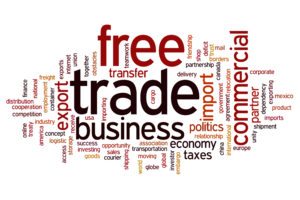Canada European Free Trade Agreement
What does it mean for U.S. shippers?
If a U.S. organization is currently buying from Europe and shipping to Canada, the organization can ship directly to their client in Canada and avoid duties!
On February 15th, 2017 the European Union’s parliament approved a landmark free trade agreement with Canada. There is no actual date of implementation as of yet since Canada and the EU must make the necessary changes to their respective legislations before the application of CETA can begin. This will include changes in tariffs, quotas, service commitments, temporary entry commitments and government procurement obligations which will benefit businesses on both sides.

depositphotos.com/ibreakstock
What is CETA?
The Comprehensive Economic and Trade Agreement is an international treaty between the European Union and Canada. CETA is the first trade agreement between the EU and a major world economy. It is also the most far-reaching bilateral trade agreement negotiated to date.
Why is the agreement important for the EU?
The EU wants to have closer economic ties with a like-minded partner – Canada. Canada is a sizeable market, an important destination for European investment and a country rich in natural resources that Europe needs. It offers energy and raw materials and is a significant source of know-how. Canada is one of the most developed non-European countries with which the EU has ever negotiated a trade deal of this size. Overall, CETA is expected to lift EU output by about €12 billion a year. By opening markets CETA should support growth and jobs in the EU and bring further benefits for European consumers. It has the potential to keep prices down and provide consumers with greater choice of quality products since 98% of products will become duty free when imported into Europe from Canada or vice versa.
Trade Picture:
In 2014 the EU-28 was Canada’s second most important trading partner, after the U.S., which accounts for nearly 10% of its external trade. In 2014 Canada was the EU’s 12th most important trading partner, accounting for 1.7% of the EU’s total external trade. Trade in goods only between the EU and Canada is worth almost €60 billion per year. The deal is expected to boost this by at least 20% by removing all the tariffs between the 2 parties.
Machinery, chemicals and transport equipment dominate the EU’s exports of goods to Canada. Commercial services- mostly transport, travel, insurance and communication services – exceeded €27 billion in 2014.
Pearls and precious metals and mineral products dominate the import of goods from Canada. Machinery and chemicals also constitute an important part of the EU’s imports from Canada. In addition, investment is also a key part of EU-Canada trade relations. The EU is the 2nd largest foreign investor in Canada and Canada the 4th largest investor in the EU. In 2013, European investments in Canada were worth €225 billion, while Canadian direct investment stocks in the EU amounted to more than €117 billion. Canadian Companies established in Europe create many jobs, share their know-how and export from Europe to foreign markets. The value of the goods they produce in the EU is worth much more than all EU-Canada trade, that is why CETA needs not only to create better conditions for trade, but also for investment.
Once implemented, the agreement is expected to increase two-way bilateral trade in goods and services by 23% or €26 billion, fostering growth and employment on both sides of the Atlantic.
What will CETA offer?
- Eliminate nearly all import duties, saving European exporters around €500 million per year.
- Allow EU companies to bid for public contracts in Canada
- Enable EU firms to access Canadian services and investment markets
- Make it easier to temporarily move key company personnel and service-providers between the EU and Canada making it easier for European companies to provide after sales service.
- Allow European engineers, accountants and architects to provide their services in Canada
- Help stop European innovations, artworks, trademarks and traditional food products from being copied unlawfully in Canada
- Strengthen cooperation between Europe and Canada
- Opportunities for service suppliers and transparent and effective investment protection and dispute settlement mechanisms.
Conclusion:
Most experts agree that both Canadian and European companies are not ready to take advantage of CETA right now thus the importance of engaging your customs broker and freight forwarder early. It will take some time before the agreement is to be implemented which means the earlier you begin exploring the possibilities and the impact that CETA can have on your company, the greater chance that your company will be part of the 20% increase in trade that is expected and the greater opportunity you will have in terms of business growth and increased revenues.
Contact:
If youre company is interested in talking to a Canadian Customs Broker, please let us know! Our partner, Action Customs Services Inc. • A.G.O. Transportation, has been our close partner for over 25 years. We are happy to help you create a seamless operation together!
